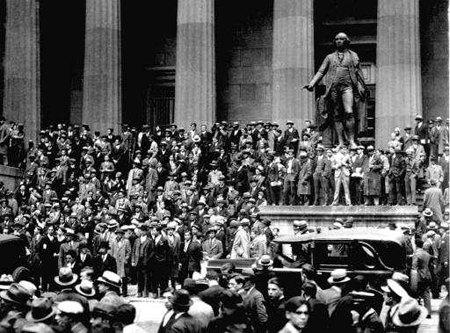General Motors Death Watch 136: Black Tuesday
In June ’05, GM CEO Rick Wagoner unveiled his turnaround plan for the beleaguered automaker: accelerate new products, eliminate discounts, renegotiate union contracts, import parts from China and downsize to match diminished demand. The last of these five points captured the critics’ imagination. “You can’t cut your way to profits,” they warned. Wagoner reacted with characteristic bravado: “We aren't going out of business in the next six months.” One wonders how those words would sound today, two days after the world learned that GM’s June sales slid 21.3 percent.
By now GM has a lot of practice explaining operating losses, shrinking sales and lost market share. Still, Black Tuesday challenged veteran mouthpiece Paul Ballew’s exculpatory skills. Once again, Ballew was determined to convince GM’s camp followers that the automaker’s sagging fortunes actually represent good governance and bad luck. To that end, Ballew rounded up the usual suspects.
GM’s Spinmeister began by pointing out that the showroom massacre was “partly attributable to a planned reduction of an additional 13,487 daily rental sale vehicles.” Although Ballew did his best to headline the fact, empirical analysis suggests additional emphasis on the word “partly.” In June, GM’s sales fell by 86,825 units (320,688 vehicles vs. 407,513). GM’s reduced fleet sales only account for 15.5 percent of the total tumble.
Ballew then trotted-out the old “soft industry” excuse. Only it turns out the U.S. automobile industry has an airtight alibi. According to Autodata, American automobile sales fell just three percent in June; from last year’s 1.5m to this year’s 1.46m. The numbers clearly indicate that the industry was tucked-up in bed at the time of GM’s bloodbath.
And anyway, how do you explain the fact that GM’s transplanted competition went nuts? Nissan posted a massive 22.7 percent sales increase. Toyota’s turnover rose by 10.2 percent. Honda’s sales ascended by 11.5 percent. Hyundai’s sales climbed 11 percent.
Surprisingly, Ballew says GM wasn’t surprised by their [continuing] shimmy down the sales charts. “We had very strong retail sales in June and July a year ago, so we knew we'd have a tough time on the retail side.”
Yes, well, that's what happens when you offer zero percent financing to anyone with a pulse for six days, and then don't. In any case, there's no getting around the fact that GM sold 50k units less in June than it did the previous month.
Ballew identified two legitimate conspirators: rising gas prices and slowing housing starts. The twin terrors tore into GM’s truck sales, scything 22.9 percent from the previous June's total. Sales of the relatively new GMC Sierra and Chevrolet Silverado pickup trucks fell 26.5 and 23.5 percent respectively.
Surprisingly, Ballew says GM was surprised by Toyota’s aggressive offers on their Texas Tundra: zero-percent financing for 60 months and $5k in dealer incentives. The fact that GM failed to realize that their deep-pocketed nemesis would slap cash on the dash to attain their 200k per annum Tundra target shows GM’s woeful lack of situational awareness.
It gets worse. Ballew hinted that his employer will react in kind, increasing incentives on its pickups to protect its turf. As predicted, Toyota’s entry into the market is gradually and inexorably taking its toll on the profitability of GM’s last remaining cash cow.
Meanwhile, GM's new product cadence has peaked, and its eight brands are in dire straits. Caddy (-28.4 percent), Chevrolet (-23.5 percent), Hummer (-10 percent), Pontiac (-18.1 percent), GMC (-16.1 percent), Buick (-30.4 percent) and Saturn (-8.8 percent) all sucked the joy out of June. Only Saab stayed above water, adding 1066 sales, topping out at 4361 vehicles.
In silver lining search mode, Paul Ballew and Marketing Maven Mark LeNeve pointed to the early success of the SUV-sales-stealing Lambda triplets (Acadia, Outlook and Enclave) — although admitting you can’t build a new model fast enough to meet demand is a curious sort of boast for a company that's boasted about reduced production.
So, where does all this leave Rick Wagoner’s turnaround plan? Accelerate new products. Flop. Eliminate discounts. Nope. Renegotiate union contracts. Health care “giveback” swallowed by soaring costs. Import cheaper parts from China. Check. Trim excess capacity. Who cares? If you didn’t believe it then, believe it now: you can’t cut your way to prosperity.
To wit: GM’s U.S. market share fell 3.3 percent in June, down from last year's 25.4 percent to this year’s 22.1 percent. (Down 8.1 percent since '90.) Toyota’s U.S. market share now stands at 16.9 percent. When you consider the disparity in the two automakers' dealership count– 7715 vs. 1740– it's easy to see which company is headed for Chapter 11, and why.
In fact, since Rick Wagoner launched his turnaround plan, GM’s market share has shrunk by 5.2 percent. No matter what else GM's CEO may or may not have achieved in that time, the figure is an irrefutable condemnation of his administration. GM's Board of Bystanders granted Rick Wagoner a bankruptcy-proof pension. It's time they activate it.
More by Robert Farago
Latest Car Reviews
Read moreLatest Product Reviews
Read moreRecent Comments
- Kwik_Shift_Pro4X No thanks. You'll never convince me that anybody needs this.
- Kwik_Shift_Pro4X I'd rather do the driving.
- SCE to AUX EVs are a financial gamble for any mfr, but half-hearted commitment will guarantee losses.BTW, if there were actual, imminent government EV mandates, no mfr could make a statement about "listening to their customers".
- Zachary How much is the 1984 oldmobile (281)8613817
- Yuda Very dystopian. Not good.


































Comments
Join the conversation
It's easy to blame management for all the ills, but I think the isolation from the real automotive world extends down the ranks at the big three. I just returned from a visit to Michigan. (BTW: a strange country; the big three's products are everywhere. In fact, they seem to be more numerous than furrin cars and trucks!) Anyway, many vehicles had this sticker on them: "Out of a job yet? Keep buying foreign!" In the rest of the country, the sticker pointed at Detroit would probably read: "Out of job yet? Keep making crap products I don't want!"
I live in the deep south and work at a blue collar machine shop. Yet a walk through the parking lot shows three times as many new model Tundras as GMT-900 based vehicles combined. GM is dead, they just haven't figured it out yet.